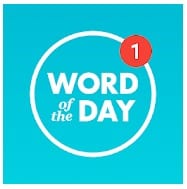

#Word of the day how to#
Surely, regular attendance in Toastmasters-listening to people’s speeches, and paying attention to the Word of the Day-can add many new words to your working vocabulary over time.īut what should club grammarians aim for when choosing a Word of the Day? Should they look for some exotic, obscure word that no one in the club has ever heard of? Or, should they choose a word that perhaps people are familiar with but tend to use or pronounce incorrectly? Even in everyday business writing, there are probably hundreds of such words-and many of us could use a reminder on when and how to use them appropriately.

According to a 2013 article in The Economist, the average native speaker of English has about 20,000 to 35,000 words in his or her vocabulary. In any case, the Word of the Day is a chance for all of us to expand our working vocabularies. Who can stay up to date on all that?! (Granted, cozen is not one of those newer ones-the dictionary says it was coined in 1573.) Nearly 15 new ones come into existence each day. In all fairness, it should be noted that the English language now has more than a million words, according to the Global Language Monitor.

It means, basically, to trick or deceive. Have you ever cozened anyone? I hope not. I scroll down a bit and come to … “cozen.” That’s right-cozen. It’s under the C’s, with “cow” and “crab” at the top. I’ve just grabbed my dictionary and opened it randomly to a page. Let me do a little experiment to prove my point. I always note with amazement all the words that I, as a native speaker of English-and, I would like to think, an intelligent and literate one at that-still do not know. Not the same way I read a book or magazine, but for 10 minutes or so at a time, thumbing through the pages or perhaps focusing on a particular letter of the alphabet. I admit that I am one of those odd people who actually read the dictionary from time to time. Please enable JavaScript in your browser to complete this form.If you are a word nerd like I am-a person who loves words, and actually gets excited about them-then you probably share my enthusiasm for the “Word of the Day” feature that is part of every Toastmasters meeting. Window.FB.Event.subscribe('xfbml.render', function() (document, 'script', 'facebook-jssdk')) Today, we celebrate National Word Nerd Day to mark the importance of words in our history and civilization, giving us an excuse to geek out on our favorites! After seven years of toil, his dictionary was published in 1755 and is still widely regarded as one of the most influential texts of the English language. Samuel Johnson, who was paid the sum of 1,500 guineas (approximately $325,000 in today’s money) for its completion. As a result, it became necessary to produce a comprehensive list of words and their meanings in the English language, a task embarked upon by Dr. Shakespeare and other great wordsmiths used their love of words to delight audiences in the theatres, even inventing words for use in their work.īut by the mid-18th century, reading and writing were more widely taught and accessible to a greater range of people. As such, the majority was only able to enjoy words through oral storytelling. Words and language became increasingly important, yet it took many centuries until they were considered important enough to document.ĭuring the medieval period, the written word was considered a luxury, with only the rich or the anointed able to read and write in a sophisticated way. With developments in our lifestyle, we needed to be able to name things, communicate ideas, and express ourselves to aid our advancement. Once, our basic vocabulary range was no different from that of great apes, but as we advanced, so did our language. Humans have communicated since we first walked on Earth, though our early language was nowhere near as complex as the systems of words we use today.


 0 kommentar(er)
0 kommentar(er)
